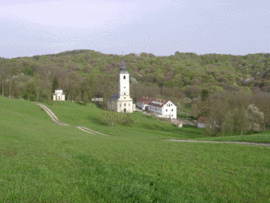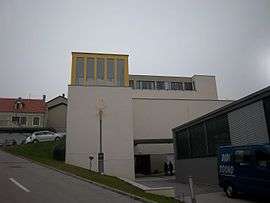Metropolitanate of Zagreb and Ljubljana
| Metropolitanate of Zagreb and Ljubljana | |
|---|---|
|
| |
| Location | |
| Territory |
Northern Croatia and Slovenia Italy (1994–2011) |
| Headquarters | Zagreb, Croatia |
| Statistics | |
| Population - Total |
300,000 est. |
| Information | |
| Denomination | Eastern Orthodox |
| Sui iuris church | Serbian Orthodox Church |
| Established | 1557 |
| Language |
Church Slavonic Serbian |
| Current leadership | |
| Bishop | Metropolitan Porfirije |
| Map | |
-en.svg.png) | |
| Website | |
| mitropolija-zagrebacka.org | |

Metropolitanate of Zagreb and Ljubljana is one of the five Metropolitanates of the Serbian Orthodox Church. The headquarters of the Metropolia is located in Zagreb, Croatia and its territory covers northern Croatia and the whole of Slovenia.
History
The above-mentioned regions are inhabited by Serbs who for the most part settled there after fleeing Bosnia before the Ottoman conquest of Bosnia. In some areas, such as the Habsburg Military Krajina, Serbs constituted the largest ethnic group. In 1438, Pope Eugene IV sent Jakob de Marcia to Slavonia as a missionary to baptize "schismatic" Serbs in "Roman religion", and if that failed, to banish them. Since the renewal of the Serbian Patriarchate of Peć in 1557, the Orthodox Serbs of Old Slavonia spiritual guidance of the Diocese of Požega, who is enthroned at the Orahovica Monastery. 1595 seat of the Diocese from Orahovica is moved to Western Slavonia in order to avoid a Turkish oppression. New headquarters is located in Marča Monastery. Marča archbishops led the difficult fight against Roman Catholic proselytism.
In addition, Monastery Marča, the other spiritual center of Orthodox Serbs in the area was and still is Lepavina Monastery. Abbot Lepavina Kondrat was killed in 1716, defending the purity of Orthodox faith. He was killed by those Serbs who had become Catholics. In 1734 the headquarters moved to a monastery at Lepavina. Serbian Orthodox bishop Simeon Filipović (1734-1743) had residence in Sjeverin. After his death and several years of administration, eparchy was abolished and in 1750 its territory came under jurisdiction of Serbian Orthodox bishops of Kostajnica. In 1771, the region came under jurisdiction of Orthodox Bishops of Pakrac, and that remained until 1931.
20th century
The Diocese received Metropolitanate status in 1931. For the first metropolitan was elected Dositej Vasić, a learned theologian, a man of broad vision and understanding in relations with other nations and religions. He was tortured and murdered during World War II in the Independent State of Croatia.
After World War II, the Zagreb Metropolitanate and the other Dioceses in the territory of Croatia were administered by Vicar Bishop Arsenije Bradvarević. He was succeeded by Damascus Grdanički, previously Bishop of Banat, and after his death in 1969, the Metropolitanate was administered by the Bishop of Slavonia, Emilian Marinović.
At the regular session of the Holy Assembly of Serbian Orthodox Church in the 1977, the spiritual guidance of this Metropolitanate is entrusted to Bishop Jovan of Lepavina (Pavlović), which was elected for Metropolit of Zagreb in 1982. On the proposal of the Metropolit Jovan, the Metropolitanate in 1993 expanded its name to the Metropolitanate of Zagreb, Ljubljana and all Italy. Jurisdiction over Serbian Orthodox churches in Italy was transferred to the Metropolitanate in 1994 and lasted until 2011. Metropolit Jovan organized the meeting of Serbian Patriarch Pavle and Cardinal Franjo Kuharić (first in the spring of 1991 in Sremski Karlovci, and the other later in Slavonski Brod). He also organized a meeting of Patriarch Pavle and the Croatian President Franjo Tuđman.
Bishops and metropolitans
Orthodox bishops and metropolitans who had jurisdiction over the territory of present-day Metropolitanate of Zagreb and Ljubljana
Bishops of Marča
- Maksim Predojević (1630—1642)
- Gavrilo Predojević (1642—1644)
- Vasilije Predojević (1644—1648)
- Sava Stanislavić (1648—1661)
- Gavrilo Mijakić (1661—1671)
Since 1705, under jurisdiction of Orthodox Bishops of Pakrac.
Eparchy of Lepavina
- Simeon Filipović (1734-1743)
- (1743-1750) administration
Bishops of Kostajnica
- Arsenije Teofanović (1750-1753)
- Josif Stojanović (1754-1771)
After 1771, again under jurisdiction of Bishops of Pakrac.
Metropolitans, since 1931
- Dositej Vasić (1931-1945)
- Arsenije Bradvarević (1945-1947), administration
- Damaskin Grdanički (1947-1969)
- Emilijan Marinović (1969-1977), administration
- Jovan Pavlović, (1977-2014)
- Porfirije Perić, (2014-present)
See also
Sources
- Вуковић, Сава (1996). Српски јерарси од деветог до двадесетог века (Serbian Hierarchs from the 9th to the 20th Century). Евро, Унирекс, Каленић.
- Mileusnić, Slobodan (1997). Spiritual Genocide: A survey of destroyed, damaged and desecrated churches, monasteries and other church buildings during the war 1991-1995 (1997). Belgrade: Museum of the Serbian Orthodox Church.
- Vjerske zajednice u Hrvatskoj, Prometej, 2008, Zagreb, Croatia (Croatian)
- Идентитет Цркве, Serb Orthodox Church (Serbian)
External links
- Official website; accessed 6 June 2015. (Serbian)
- Lepavina monastery webpage; accessed 6 June 2015. (Croatian)
- The Serbs in the Former SR of Croatia
- His All-Holiness Ecumenical Patriarch Bartholomew in Zagreb


